

The Internet Dragnet Was a Clusterfuck … and NSA Didn’t Care. Here’s my best description from last year of the mind-boggling fact that NSA conducted 25 spot checks between 2004 and 2009 and then did a several months’ long end-to-end review of the Internet dragnet in 2009 and found it to be in pretty good shape, only then to have someone discover that every single record received under the program had violated rules set in 2004.

The US government can brand you a terrorist based on a Facebook post. We can't let them make up the rules. The US government’s web of surveillance is vast and interconnected.
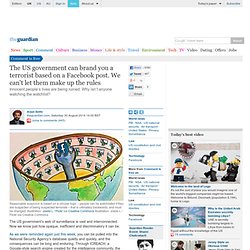
Now we know just how opaque, inefficient and discriminatory it can be. As we were reminded again just this week, you can be pulled into the National Security Agency’s database quietly and quickly, and the consequences can be long and enduring. Through ICREACH, a Google-style search engine created for the intelligence community, the NSA provides data on private communications to 23 government agencies. More than 1,000 analysts had access to that information. This kind of data sharing, however, isn’t limited to the latest from Edward Snowden’s NSA files. The watchlist tracks “known” and “suspected” terrorists and includes both foreigners and Americans.
Of the 680,000 individuals on that FBI master list, roughly 40% have “no recognized terrorist group affiliation”, according to the Intercept. The absurdities don’t end there. This vague criteria is now being used to label innocent people as terrorism suspects. The NSA and Me. The tone of the answering machine message was routine, like a reminder for a dental appointment.
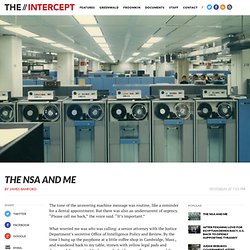
But there was also an undercurrent of urgency. Wife: NSA Official. Husband: Exec At Firm Seeming To Do Or Seek Business With NSA. US threat of fines forced Yahoo to hand over users′ data. The US government asked a court to threaten Yahoo with fines of $250,000 (193,500 euros) per day unless it handed over customers' email information to intelligence agencies, court documents released on Thursday showed.
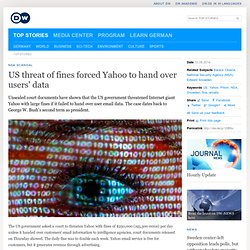
The daily fine was to double each week. Yahoo email service is free for customers, but it generates revenue through advertising. A Guide to the Deceptions, Misinformation, and Word Games Officials Use to Mislead the Public About NSA Surveillance. It’s been two months since President Barack Obama first said that he welcomes a debate about NSA surveillance, which he once again reiterated last week at his press conference.
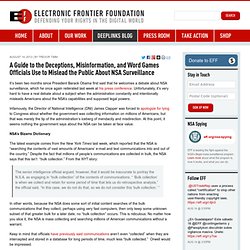
The NSA Files: PRISM & Boundless Information. NSA and Edward Snowden (Vox.com card stack) The National Security Agency is the US government agency responsible for electronic surveillance.
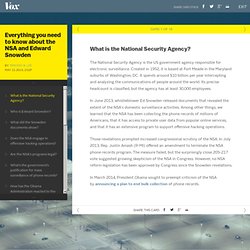
Created in 1952, it is based at Fort Meade in the Maryland suburbs of Washington, DC. It spends around $10 billion per year intercepting and analyzing the communications of people around the world. Its precise headcount is classified, but the agency has at least 30,000 employees. NSA National Security Agency. Keith Alexander Unplugged: on Bush/Obama, 1.7 million stolen documents and other matters. Photo credit: Evan Vucci/AP The just-retired long-time NSA chief, Gen.
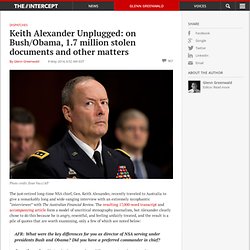
Keith Alexander, recently traveled to Australia to give a remarkably long and wide-ranging interview with an extremely sycophantic “interviewer” with The Australian Financial Review. The resulting 17,000-word transcript and accompanying article form a model of uncritical stenography journalism, but Alexander clearly chose to do this because he is angry, resentful, and feeling unfairly treated, and the result is a pile of quotes that are worth examining, only a few of which are noted below: AFR: What were the key differences for you as director of NSA serving under presidents Bush and Obama? Did you have a preferred commander in chief? Unnecessary and Disproportionate: How the NSA Violates International Human Rights Standards. Even before Ed Snowden leaked his first document, human rights lawyers and activists were concerned about law enforcement and intelligence agencies spying on the digital world.
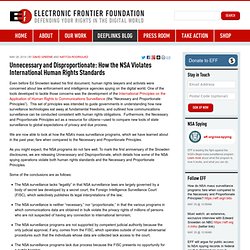
One of the tools developed to tackle those concerns was the development of the International Principles on the Application of Human Rights to Communications Surveillance (the “Necessary and Proportionate Principles”). This set of principles was intended to guide governments in understanding how new surveillance technologies eat away at fundamental freedoms, and outlined how communications surveillance can be conducted consistent with human rights obligations.
NSA Said to Exploit Heartbleed Bug for Intelligence for Years. The U.S.
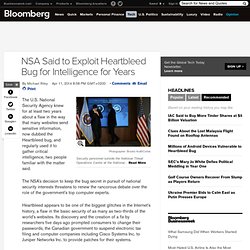
National Security Agency knew for at least two years about a flaw in the way that many websites send sensitive information, now dubbed the Heartbleed bug, and regularly used it to gather critical intelligence, two people familiar with the matter said. The NSA’s decision to keep the bug secret in pursuit of national security interests threatens to renew the rancorous debate over the role of the government’s top computer experts.
Heartbleed appears to be one of the biggest glitches in the Internet’s history, a flaw in the basic security of as many as two-thirds of the world’s websites. Its discovery and the creation of a fix by researchers five days ago prompted consumers to change their passwords, the Canadian government to suspend electronic tax filing and computer companies including Cisco Systems Inc. to Juniper Networks Inc. to provide patches for their systems. Related: Controversial Practice Free Code. Everyone should know just how much the government lied to defend the NSA. If you blinked this week, you might have missed the news: two Senators accused the Justice Department of lying about NSA warrantless surveillance to the US supreme court last year, and those falsehoods all but ensured that mass spying on Americans would continue.
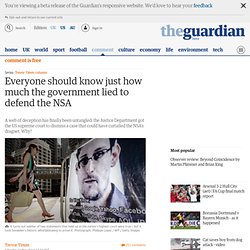
But hardly anyone seems to care – least of all those who lied and who should have already come forward with the truth. Here's what happened: just before Edward Snowden became a household name, the ACLU argued before the supreme court that the Fisa Amendments Act – one of the two main laws used by the NSA to conduct mass surveillance – was unconstitutional. In a sharply divided opinion, the supreme court ruled, 5-4, that the case should be dismissed because the plaintiffs didn't have "standing" – in other words, that the ACLU couldn't prove with near-certainty that their clients, which included journalists and human rights advocates, were targets of surveillance, so they couldn't challenge the law.
'We're At Greater Risk': Q. & A. with General Keith Alexander. Since Edward Snowden’s revelations about government surveillence, we know more about how the National Security Agency has been interpreting Section 215 of the Patriot Act and Section 702 of the Foreign Intelligence Surveillance Act. We’ve learned some new words —“bulk metadata,” “selector,” “reasonable articulable suspicion,” “emphatic-access restriction”—but we don’t really know how much of this works in practice. The intelligence community isn’t used to explaining itself in public, but over the past few months, with much prodding by Congress and the press, it has taken some small, tentative steps. Last week, I spent an hour with General Keith B. Alexander, who retired in March after eight years as the director of the N.S.A. The forces pushing for omnivorous data collection are larger than any one person, but General Alexander’s role has been significant.
Today’s NSA-Related Orwellianism: “Derived From” As I noted in this post, the government has submitted its response to Mohamed Osman Mohamud’s motion for discovery on how DOJ came to forget to tell him he had been discovered through the use of Section 702 spying. The bulk of their argument basically boils down to this assertion, which they repeat in many forms throughout their response. A remedy for untimely notice exists under FISA: the defendant will be given the opportunity to challenge evidence obtained or derived from FISA collection in a suppression hearing governed by the procedures set forth in FISA.
That is, they argue the only thing Mohamud is entitled to is an opportunity to challenge the Section 702 evidence, which they intend to prevent adversarial review of by chanting “national security.” NSA Panel Member Recommends Increased Data Collection. Michael Morell, the former acting director of the CIA and a member of President Obama's task force on surveillance, said in an interview on Sunday that a controversial telephone data-collection program conducted by the National Security Agency should be expanded to include emails. He also said the program, far from being unnecessary, could prevent the next 9/11. Morell, seeking to correct any misperception that the presidential panel had called for a radical curtailment of NSA programs, said he is in favor of restarting a program the NSA discontinued in 2011 that involved the collection of "metadata" for Internet communications.
That program gets only a brief mention in a footnote on page 97 of the task-force report, "Liberty and Security in A Changing World. " Access.org: NSA Review Board Report Card. The NSA's New Code Breakers - By Matthew M. Aid. There was a time when the code breakers of the National Security Agency actually took the lead in solving enemy encryption systems. These days, not so much. In today's NSA, it's hackers, break-in artists, corporate liaisons, and shadow salesman using front companies who are at the forefront of this effort. Even so-called "hacktivists" play an unwitting role in helping the NSA gain access to computer networks -- both hostile and friendly. NSA Implementing 'Two-Person' Rule To Stop The Next Edward Snowden. The next Edward Snowden may need a partner on the inside. On Tuesday, National Security Agency Director Keith Alexander told a congressional hearing of the Intelligence Committee that the agency is implementing a “two-person” system to prevent future leaks of classified information like the one pulled off by 29-year-old Booz Allen contractor Edward Snowden, who exfiltrated “thousands” of files according to the Guardian, to whom he has given several of the secret documents.
“We have to learn from these mistakes when they occur,” Representative Charlies Ruppersberger said to Alexander in the hearing. Meet the Spies Doing the NSA's Dirty Work - By Shane Harris. The NSA has its own team of elite hackers. NSA headquarters at Fort Meade, MD where TAO's main team reportedly works (Wikipedia) “Whoa Whoa Whoa, Stop!” Dianne Feinstein Misstates the 2011 Violations. One of the most enlightening aspects of yesterday’s Senate Intelligence Hearing on FISA came when Dianne Feinstein tried to rebut witness Tim Edgar’s categorization of the 2011 violations described in John Bates October 8, 2011 opinion.
In her rebuttal, she proved she either doesn’t know, doesn’t understand, or chooses to misrepresent the opinion, which found that NSA had violated the law and Fourth Amendment in its Section 702 program. Edgar was arguing (see page 5-6) that if the FISA Court opinions were publicly released, we’d know about ridiculous semantic definitions — like “relevant” — as those definitions were invoked, not years after the fact, which would lead to greater trust in the FISC. Dianne Feinstein Accidentally Confirms That NSA Tapped The Internet Backbone. Government Standards Agency “Strongly” Suggests Dropping its Own Encryption Standard. Lavabit, Silent Circle Shut Down: Crypto In Spotlight - Security - Two encrypted email services shut the doors; gag order clouds details of apparent U.S. government interest related to Snowden case. First Unitarian Church of Los Angeles v. NSA. Twenty-two organizations including Unitarian church groups, gun ownership advocates, and a broad coalition of membership and political advocacy organizations filed suit against the National Security Agency for violating their First Amendment right of association by illegally collecting their call records.
NSA Rejecting Every FOIA Request Made by U.S. Citizens. Originally published at Tikkun Daily | The NSA Can't Tell the Difference Between an American and a Foreigner - By Shane Harris. The National Security Agency has said for years that its global surveillance apparatus is only aimed at foreigners, and that ordinary Americans are only captured by accident. Silicon Valley Doesn't Just Help the Surveillance State—It Built It - Michael Hirsh. Netflix, Facebook — and the NSA: They’re all in it together. NSA Mimics Google, Pisses Off Senate. US & NSA Accused of Criminal Privacy Violations in Dozens of Nations - Snowden Blowback. Bush Lets U.S. Spy on Callers Without Courts. Russ Tice, Bush-Era Whistleblower, Claims NSA Ordered Wiretap Of Barack Obama In 2004. Bush-Era NSA Whistleblower Makes Most Explosive Allegations Yet About Extent of Gov’t Surveillance — and You Won’t Believe Who He Says They Spied On.
NSA collected Americans' email records in bulk for two years under Obama. NSA inspector general report on email and internet data collection under Stellar Wind – full document. AT&T whistleblower claims to document illegal NSA surveillance. Former FBI counterterrorism agent on the ability to retrieve anyone's past digital communication. The Daily Caller » What do They know about you? An interview with NSA analyst William Binney » Print.
The NSA Is Building the Country's Biggest Spy Center (Watch What You Say) Revelations Give Look at Spy Agency’s Wider Reach. Legislation Seeks to Bar N.S.A. Tactic in Encryption. NSA admits listening to U.S. phone calls without warrants. Former NSA Director Michael Hayden Responds To Edward Snowden Claim. Judge: “NSA exceeded the scope of authorized acquisition continuously” Judge on NSA Case Cites 9/11 Report, But It Doesn’t Actually Support His Ruling. NSA warrantless surveillance controversy - Wikipedia, the free encyclopedia - en.wikipedia.org. Mounting Evidence of NSA's Warrantless Surveillance. New Details Show Broader NSA Surveillance Reach. 2013_08_21_Joint_Statement_ODNI_NSA.pdf. An Illustration of How the NSA Misleads the Public Without Technically Lying. Hearing No Evil. Meet Obama’s lawyer at the NSA, the next guy about to undergo some serious surveillance - Quartz.
NSA General Counsel Rajesh De Speech at Georgetown. Under Obama, Patriot Act Sneak-and-Peek Outpaces Bush Use (and is mostly about Drugs) NSA surveillance everywhere.